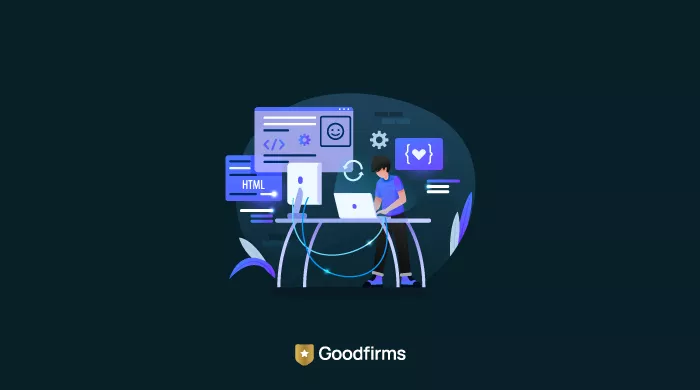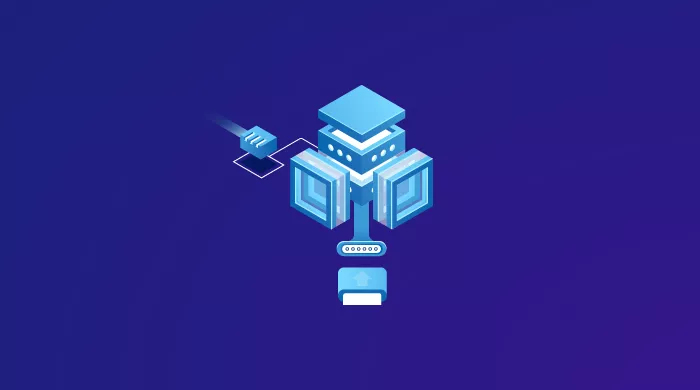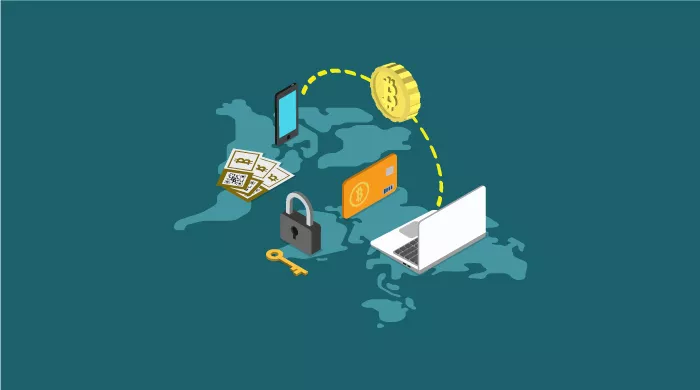The business world is Blockchainizing.
Industries' large-scale adoption of Blockchain can be attributed to several countries advocating its large-scale use and parallelly offering a conducive environment that fuels its further growth trajectory.
When we think of top blockchain countries heavily advocating Blockchain development, the first names that come to our minds are the U.S., China, and India. The governments here are excellent at regulating their policies and procedures, enabling industries to embrace Blockchain without hassle.
So, it is no surprise that global spending on blockchain solutions will reach $19 billion in 2024. The global blockchain technology market, estimated to be USD 4.8 billion in 2022, is expected to grow at a compound annual growth rate (CAGR) of 85.7% from 2023 to 2032, reaching a staggering USD 2,334.46 billion by 2032.
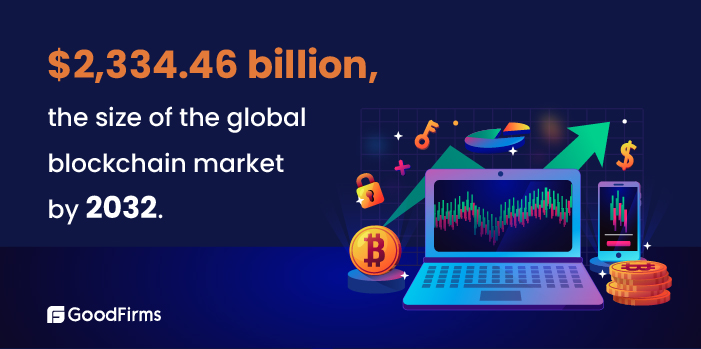
Now, the question is, what exactly favors Blockchain's unencumbered growth that's prompting industries and governments globally to embrace it with such zest and enthusiasm?
Blockchain's steady rise can partly be attributed to crypto's widespread circulation. There are 516 million crypto users today, translating into 516 blockchain users, as crypto transactions solely depend on blockchain technology. Plus, there are 81 million blockchain wallet users. Holding and exchanging cryptos, in addition to steady growth in wallet users, saw Blockchain's unhindered growth in the personal space.
Besides, thanks to its decentralized nature, Blockchain has emerged from the shadows of being a crypto-centric technology and is breaking new ground in the industrial space.
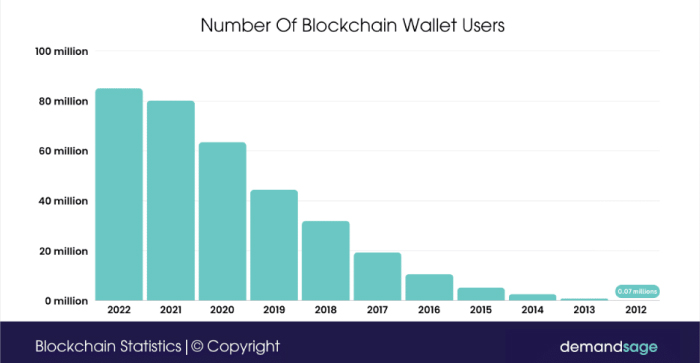
A blockchain's decentralized nature implies that data is not confined to a single computer system but is spread across different computers, dissuading hackers. Simply put, hackers must hack all or most computers to gain data, as hacking data from a single computer would lead them nowhere.
And, yes, of course, there's more to Blockchain than just the decentralized feature. Check out this informative article by Tech Target, "Top 10 Benefits of Blockchain for Business," to get an in-depth insight into how Blockchain's many incredible features could benefit businesses.
Wondering which industries are majorly benefitting from blockchain technology?
Top Industries Witnessing Heavy Blockchain Adoption In Recent Years
Nearly 90% of businesses reported adopting Blockchain in some capacity, and 86% of enterprises believe leveraging Blockchain will take their business to the next level.
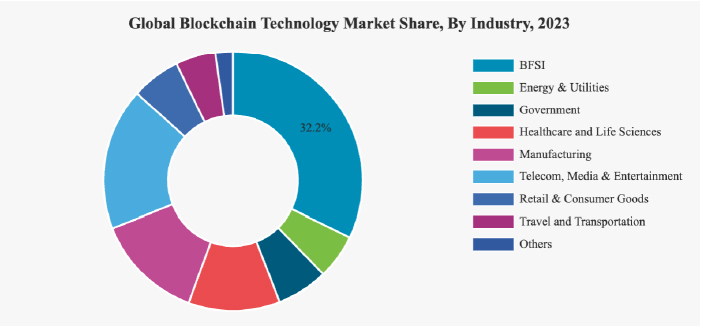
source: fortunebusinessinsights
Blockchain Adoption in Financial Services and Banking
As it turns out, Banks and financial institutions are the biggest beneficiaries of Blockchain, as they use it for multiple reasons.
- Safe and secure transactions
- Speedier processes in the form of faster settlement, clearance systems, and KYC
- Faster and cost-effective cross-border payment transfers
- Tokenization: Converting expensive stuff into tokens to make them more saleable
- Faster loan clearance
Blockchain in Supply Chain
Another sector profiting from blockchain adoption is the supply chain market.
- Tracks the entire product journey—from the manufacturer to the consumer—via the supply chain network
- Increased transparency and fraud reduction
- Smart Contract eliminates the need for human intervention
Blockchain in Healthcare
As it turns out, even the healthcare industry benefits from blockchain usage colossally.
- Healthcare providers can share information easily, thus improving patient care
- Data privacy as blockchain keeps private health details safe from hackers
- Research and Clinical trials as blockchain help track every step and protect data
Blockchain in Real Estate
Several challenges mar Real Estate, such as a lack of transparency, complex paperwork, many intermediaries, poor transaction speed, and expensive investments. The use of blockchain has helped streamline the real estate sector.
- Secure and transparent record of ownership and transactions
- Automation of tasks like document verification and transfer
- Lower transaction costs as no intermediaries or real estate agents involved
- Fractional ownership of properties makes real estate investment accessible to many
Blockchain in Education
Like the real estate sector, education suffers from a lack of transparency and security. Paper diplomas and transcripts are easily forged, access to quality education is limited, and even sharing academic transcripts is time-consuming and cumbersome. Blockchain in education ensures:
- Transparent record-keeping
- Eliminates the need for physical copies with the availability of digital copies
- Customized learning experiences as per student requirements
Blockchain in Online Gaming
Like other industries, even online gaming is equally gaining from blockchain technology use:
- Blockchain’s decentralized and distributed digital ledger features enable secure transactions and record-keeping in gaming.
- Gamers can use NFTs and cryptocurrencies to purchase in-game assets and even exchange them for real-life money.
Heavy industry adoption of blockchain technology has prompted several countries to regulate their processes and policies and wholeheartedly embrace this technology of the future.
We plan to cover the adoption of Blockchain technology in two parts. The first part will focus on three countries, the United States, China, and India, where blockchain adoption has been soaring significantly. The second part will cover seven more countries.
Top 3 Blockchain Countries Advocating its Use in 2024
The United States, China, and India have already put their foot on Blockchain gas. Given how industries globally are taking advantage of this technology, it makes more business sense for these three countries to climb the blockchain bandwagon without further ado.
Before we discuss the top blockchain countries, let’s first examine the factors driving blockchain adoption across countries.
Factors Driving Blockchain Adoption Across Countries
- Conducive government regulations that attract businesses and investment
- An ecosystem of funding and Investment opportunities as blockchain development demands colossal investment
- A culture of innovation and research that wants to leave a deeper impact in the blockchain technology market
- Greater willingness of businesses and individuals to adopt this technology.
Blockchain Development in US
The U.S. blockchain market will significantly surge, as Americans will spend almost $41 billion by 2025 on several blockchain products and services.
According to security.org, cryptocurrency awareness and ownership rates have touched an all-time high in the U.S. From 30% in 2023, 40% of American adults own a crypto today. This translates into almost 93 million people in the U.S. alone. Believe it or not, nearly 63% of crypto owners plan to obtain more cryptocurrency in the coming years.
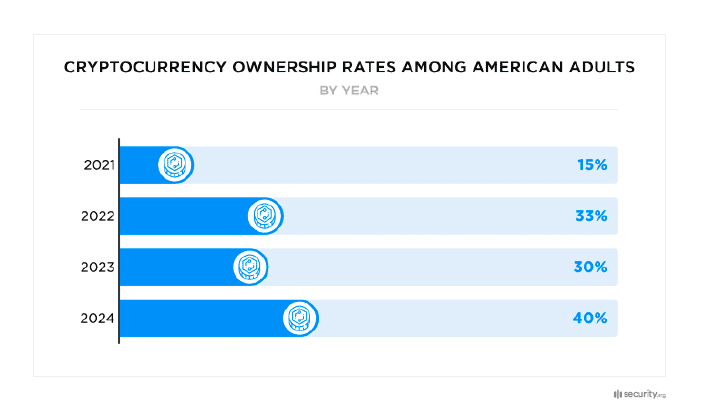
Source: security.org
Not surprisingly, many Blockchain startups, such as NYDIG and Celsius, have attracted big investors. NYDIG received investments totaling $1 billion. The U.S. government is also exploring the use of blockchain for various applications.
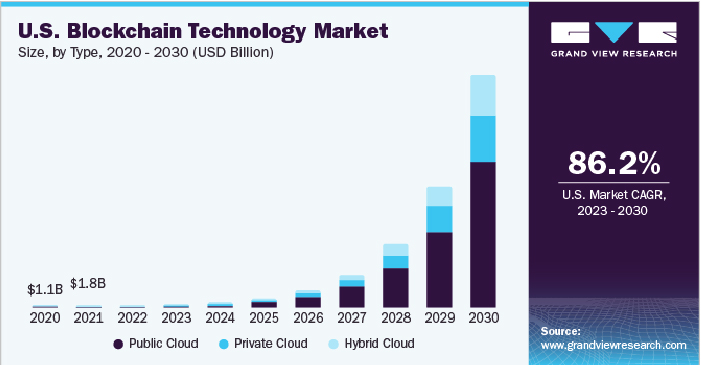
Case Studies: Successful Implementations of Blockchain Applications in the U.S.
Banks and Financial Institutions: Nasdaq is using blockchain to improve the speed and efficiency of its stock trading process. At the same time, J.P. Morgan has launched Onyx, a first-of-its-kind bank-led blockchain platform for exchanging information, value, and digital assets.
Supply Chain: Walmart, for example, leverages blockchain to track the movement of pork in China.
Healthcare: The FDA, for instance, uses blockchain to track medical products throughout the supply chain, while the Mayo Clinic uses it to store patient data securely.
Needless to say, the U.S. market has the wherewithals ( top blockchain developers and companies with experience and expertise) to develop and deploy top-tier Blockchain applications across all sectors.
Top Blockchain Development Companies in USA
Goodfirms has listed all top blockchain development companies in USA based on client reviews, market presence, portfolio, development strength, experience, and expertise. Although all these companies mainly focus on US markets, they also serve other global markets. Here’s a list of the top 5 best blockchain development companies in USA.
- OpenXcell
- SoluLab
- Quytech
- Cubix
- Idealogic
OpenXcell
OpenXcell houses some of the best-talented blockchain developers in the U.S. With no fewer than 15+ years up its sleeve, this blockchain development company has been at the forefront of all innovations and technological revolutions, embracing every technology with utmost ease and profound finesse, and the same goes with Blockchain as well. As part of Blockchain services, the company offers Blockchain consulting, Smart Contract Development, Custom Blockchain Development, dApps Development, Crypto Wallet Development, and NFT Marketplace Development.
SoluLab
SoluLab is no stranger to Blockchain technology. With a thorough grounding in tech that saw Fortune 500 companies and high-growth startups greatly benefit from their valuable partnership, the company’s blockchain developers today have sound knowledge in building Blockchain games, Ethereum Tokens, Web 3.0, Defi, dApps, blockchain-powered Metaverse, and much, much more.
Quytech
A rich portfolio that boasts 1000+ successful projects developed and deployed by 200+ seasoned developers, leading to no fewer than 500+ satisfied clients, and you know for sure that you can’t get a better alternative than Quytech when it comes to Blockchain solutions. The company has put in place pre-vetted blockchain developers in the U.S. with first-hand experience in Ethereum, Steller, Hyperledger, and more that aids in the timely delivery of blockchain projects.
Cubix
With operations in 50+ countries, Cubix is especially interested in the US market, given Blockchain’s unhindered popularity there. Backed by a talented team of 250+ employees, the company offers tailored blockchain solutions to businesses globally. It has expertise in the blockchain supply chain, decentralization, e-wallet platform, and Blockchain-cloud services.
Idealogic
Idealogic offers advanced technology solutions powered by Blockchain that boasts security, transparency, and efficiency in business processes. With 10+ years of experience, the company develops and deploys public and private blockchains, CEX & DEX Development,
DeFi & GameFi Solutions, Smart Contracts Development, Tokenization Solutions and Apps
Blockchain Developer Salary in the U.S
Here's an approximate range for the hourly rates of junior, mid-level, and senior blockchain developers in the U.S.
According to talent.com, the average salary of a blockchain developer in the US is $146,250, which translates into $70.31 per hour. The entry-level salary of blockchain developers starts at $124,500 per year, while the experienced ones charge $185,150 per year.
Ballpark Estimate of Blockchain Developer Hourly Rate In the U.S.
Junior Blockchain Developer: approx $60 - $80 per hour
Mid-Level Blockchain Developer: approx $100 - $150 per hour
Senior Blockchain Developer: approx $150 - $200+ per hour
Blockchain Regulations in the U.S. - Key Players
There is no unified regulatory framework for blockchain technology in the U.S. However, several regulations from various government agencies exist depending on blockchain uses.
Here’s a list of key players in the U.S. Blockchain market:
Securities and Exchange Commission (SEC):
If the SEC considers a token a security, it falls under federal securities laws. This automatically implies that the company releasing the token must register with the SEC and agree to disclosure requirements. The disclosure offers investors crucial information about the investment risks involved.
Commodity Futures Trading Commission (CFTC):
The CFTC oversees the US derivatives markets, including monitoring how blockchain technology is being used in these markets.
Financial Crimes Enforcement Network (FinCEN):
FinCEN works around anti-money laundering (AML), combating the financing of terrorism (CFT), regulating Money Services Businesses (MSBs) that deal with cryptocurrencies, and ensuring they register and implement AML/CFT programs.
Other Regulatory Bodies:
Other federal or state agencies will have a say in regulations depending on the application (e.g., healthcare, supply chain).
#2. Blockchain Development in China
.jpg)
Though crypto mining and cryptocurrency use are restricted in China, the government strongly supports Blockchain technology.
In fact, China has been at the forefront of Blockchain technology development since 2019, when President Xi Jinping's speech called for the country to ‘seize the opportunities’ presented by Blockchain technology.
Not surprisingly, China’s blockchain application market reached 8 billion yuan in 2022. It is projected to scale over 27 billion yuan by 2025 and nearly 69 billion yuan by 2030 as many industries have increasingly integrated Blockchain technology into their operations. Like the U.S., the Chinese market has seen a surge in blockchain usage, specifically in finance, government, and logistics industries, thanks to solid government backing.
More to the point, the Chinese government has launched the Blockchain Service Network (BSN). BSN is a one-stop shop for cost-effectively deploying blockchain applications in the cloud. The product mainly serves companies operating in cloud computing infrastructure. These could be large international public cloud players like Amazon and Microsoft or domestic companies that run small-time private clouds or intranets.
The Chinese company’s other attractive USP is its interoperability; in other words, making different blockchains work together is not easy in the existing blockchain system. For instance, if land records have been registered on two different blockchain platforms, they may not be able to work together. However, applications built on BSN infrastructure are programmed to be interoperable, plugging in blockchain platform gaps.
Government support has paved the way for a thriving Blockchain research and development community in the US. Universities and technology companies are heavily involved in this field to optimize blockchain scalability and devise consensus mechanisms.
Case Studies: Successful Implementations of Blockchain in Real-world Applications in China
China is actively exploring blockchain technology for various applications. Here, we discuss two successful case studies that speak volumes about its real-world implementation in China.
1. Tracking Counterfeit in Wine Supply Chains
China has a thriving market for fake wines, much to the chagrin of the government out there. Nearly 30,000 bottles of counterfeit wines are sold per hour in China. These wines are churned using dangerous additives and chemicals to speed up vinification.
Origintrail—a blockchain platform provider—and TagItSmart—a blockchain-based logistics tool—were paired to create a unique blockchain solution for the wine industry. The solution used smart sensors to track wine frauds, and in the pilot program itself, the blockchain pair (Oridintrail and TagItSmart) tracked down 15,000 unique bottles to their sources. The pilot’s success has enabled Origintrail to expand its services to other industries in China.
2. Combating Food Fraud
Besides fake wine supply chains, China also encounters issues in food safety, as fake ingredients and mislabeling are highly prevalent. So, it is no surprise that several companies use blockchain technology to track food origin and movement.
JD.com, an e-commerce platform, employs blockchain to track the origin of Australian rock lobsters and ensure the quality of its products.
Other areas where Blockchain technology is leveraged in China include:
- Intellectual Property Protection
- Healthcare Data Management,
- Cross-border Payments
It’s crucial to note that blockchain regulations are still evolving in China. However, blockchain’s initial successful implementations could be mimicked in other sectors of the Chinese economy.
Top Blockchain Development Companies in China
The Chinese market is second to none in adopting blockchain technology. Here are the 5 top Blockchain Companies in China as per Goodfirms listing.
- NEO Smart Economy
- VeChain Tech
- Origin Trail
NEO Smart Economy
NEO is a smart contract platform backed by a global developer community. It is one of the most feature-rich blockchain platforms for building decentralized applications. The company enables developers to digitize asset management via smart contracts and offers robust native infrastructure in decentralized storage, domain name service, oracles, and more.
VeChain
Vechain is a secure and scalable blockchain platform for real-world applications. It is especially targeted toward supply chain management and sustainability initiatives. The company offerings include Vechain Thor, a public, secure blockchain platform for enterprise use. Vechain also uses Proof of Authority for transaction validation and on-chain governance, whereby token holders participate in network upgrades via an on-chain voting mechanism.
Origin Trail
Origin Trail does not focus on cryptocurrency; its area of expertise is a specific application of blockchain technology called a Decentralized Knowledge Graph (DKG). DKG is built on blockchain technology, which makes the information verifiable and trustworthy. Anyone can create and share trustworthy chunks of information called “Knowledge Assets.” AI systems can use these assets.
Blockchain Developer Salary in China
Salary.com says the average blockchain developer salary in China is ¥435,954, or ¥210 hourly, which translates to $1.38. A junior-level blockchain developer with 1-3 years of experience earns around ¥309,316, while a senior-level blockchain developer with 8+ years of experience earns an average salary of ¥546,907.
Ballpark Estimate of Blockchain Developer Hourly Rate In China
Junior Blockchain Developer: ¥800 - ¥1,500 per hour (approx $120 - $220)
Mid-Level Blockchain Developer: ¥2,000 - ¥3,000 per hour (approx $300 - $440)
Senior Blockchain Developer: ¥3,500 and above (approx $520 and upwards)
Blockchain Regulations in China - Key Players
China's approach to blockchain is akin to India's—half-hearted. Both countries have okayed the use of blockchain but are strictly regulating cryptocurrency use.
Here's a list of the key players in China's blockchain landscape:
People's Bank of China (PBOC): The central bank strongly supports blockchain adoption and is the face behind China's central bank digital currency (e-CNY), which leverages blockchain technology.
National Internet Finance Association of China (NIFA): Set up by the PBOC, NIFA helps circumvent financial risks associated with blockchain applications.
Other Government Agencies: Depending on the specific application (e.g., supply chain, healthcare), ministries such as the Ministry of Industry and Information Technology (MIIT) or the China Securities Regulatory Commission (CSRC) might regulate blockchain use in these sectors.
#3. Blockchain Development in India
Indian blockchain technology is estimated to grow at a CAGR of 82.3% from 2022 to 2030. More than anything, there's a buzz that the Indian government is planning to establish a "National Blockchain Framework."
Dubbed the "Unified Blockchain Framework," the idea is to offer a National Blockchain Service and create a thriving ecosystem around this technology to provide blockchain-as-a-service infrastructure so that developers don't have to spend their nights worrying about setting up their blockchain nodes or, for that matter, their security and interoperability with other blockchains. Plus, it offers intelligent contract templates for several use cases.
More to the point, India ranks at the top regarding cryptocurrency adoption, with almost 93.5 million people of the 1.42 billion owning cryptocurrency as of 2023. The country's increasing interest in digital currency and thriving IT sector have largely contributed to India's bagging the first spot in the index rating.
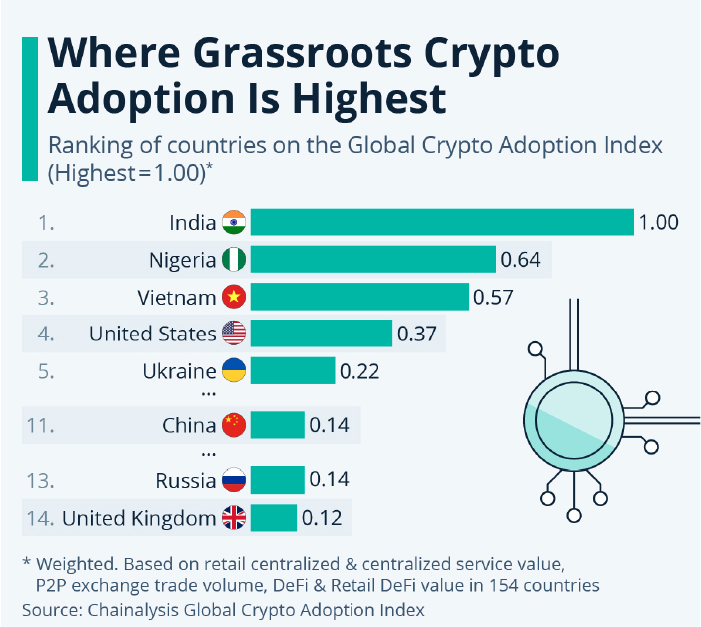
However, crypto is not considered a legal currency in India, so there are no rules and guidelines for settling cryptocurrency disputes. Currently, the Indian government considers it an asset for trading and speculation.
Case Studies: Successful Implementations of Blockchain in Real-world Applications in India
Blockchain is a promising technology that can potentially transform various sectors in India.
1. Supply Chain Management:
Transparency and traceability
The Indian agriculture industry has never had it easy as it’s continually plagued by issues such as lack of transparency, traceability, and unfair pricing. With several intermediaries involved, the farmers were the ones who were at the receiving end, with their profits severely affected by the process. This is where Blockchain comes as a blessing in disguise for farmers.
Consider the “eNAM" platform (Electronic National Agriculture Market). Launched by the Government of India in 2016, the eNAM platform harnesses blockchain technology to connect farmers, traders, and markets across the country, thus creating a transparent and efficient supply chain for buying and selling agricultural products.
In addition, the platform offers real-time information about prices, demand, and product quality. It also ensures that transactions are secure, transparent, and tamper-proof, thus reducing fraud and improving stakeholder trust.
Farmer Empowerment
Agritech startups such as Ninjacart, Crofarm, Waycool, Farmlink, etc., are employing blockchain technology to connect farmers with consumers directly, thus eliminating the need for middlemen and empowering farmers.
2. Land Record Management
For the uninitiated, with 1.43 million people, India is the most populated country in the world, and in terms of land area, India is the seventh-largest country. By far, land registrations were done manually, with several intermediaries having access to the data. Data could be tampered with anytime and anywhere, leading to ownership and land litigation issues. Blockchain-based land record management systemsmake property registration more streamlined and straightforward, reducing disputes and improving transparency in return.
3. Identity Management
Organizations like Idemia are launching blockchain-based digital identity solutions, providing users with easy access to public and private sector services, offering them secure control over their personal information, and streamlining their KYC process.
4. Healthcare
Just like Blockchain assists in Land Record Management, the technology is also ideal for Medical Data Management. The healthcare industry follows fragmented traditional systems, which makes accessing and sharing data across multiple healthcare systems a highly cumbersome process.
Plus, the centralized nature of data recording makes it vulnerable to security breaches and unauthorized access, making the entire process of patient data management insecure and inefficient. Blockchain-based patient data management systems address these issues by creating a method to store and share patient data securely in real-time. India is currently running pilot projects to assess their feasibility and benefits.
Moreover, blockchain-based data management helps reduce fraud or manipulation while processing hospital medical bills and insurance claims.
Like other markets, the Indian blockchain market continually evolves and explores opportunities different sectors could adopt. So, going forward, we could witness several industry-specific blockchain applications emerge catering to various industries.
Top Blockchain Development Companies in India
As mentioned above, OpenXcell, Solulabs, and Quytech are global players, and we’ve already covered them under top Blockchain Companies in the U.S.
However, these three companies significantly focus on Indian markets as per Goodfirms listing:
Debut Infotech
Debut Infotech is an India-based blockchain development company that tailors blockchain solutions using a team of top developers. The company builds scalable and secure blockchain solutions and has acquired expertise in smart contracts, decentralized apps, and blockchain integration.
Quest Global Technologies
With its highly skilled blockchain developers, Quest Global Technologies offers a range of blockchain development solutions, including NFT, smart contracts, and DeFi applications.
Deqode
Deqode has the rich industry expertise and, along with distributed ledger expertise, helps them conceive, design, and test real-world blockchain applications, at the same time mitigating and addressing nagging Blockchain issues such as interoperability, scalability, and business process re-alignment across network participants.
Blockchain Developer Salary in India
According to Amitionbox, the salary of a Blockchain Developer in India ranges between? 2.0 Lakhs and? 20.0 Lakhs, with an average annual wage of? 9.4 Lakhs.
Ballpark Estimate of Blockchain Developer Hourly Rate In India
Entry-level Blockchain Developer - Approx $19 to $31
Mid-level Blockchain Developer - Approx $38 to $56
Senior Blockchain Developer - Approx $63 and upwards
Blockchain Regulations in India - Key Players
Like most countries, the Indian blockchain is still nascent, with no unified body overseeing its operations.
Here's a list of the key players in India's blockchain landscape:
Central Government Bodies:
Ministry of Finance (MoF): The MoF has a major role as it directly influences the Indian government's stance on cryptocurrencies and blockchain technology. The ministry develops budgets and legislation related to virtual digital assets (VDAs), or cryptocurrencies, in India.
Reserve Bank of India (RBI): The central bank cautiously treads the cryptocurrency. For instance, in a circular issued in 2018, the RBI prohibited banks from dealing with companies using cryptocurrencies, though the Supreme Court overturned this ruling in 2020. The RBI is still figuring out its stance on VDAs and potential regulations.
Securities and Exchange Board of India (SEBI): SEBI controls securities markets in India and even monitors token trading, considered a security under Indian regulations.
Wrapping up
Stay tuned for Part 2 of this blog series, where we'll further explore top blockchain countries (7 more) that have embraced blockchain technology and are shaping the tech future of their countries and the world in general! We'll investigate their government regulations, successful case studies, and the best blockchain development companies leading the charge.





